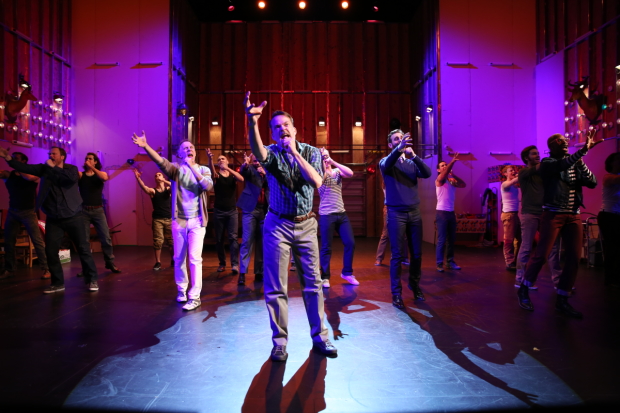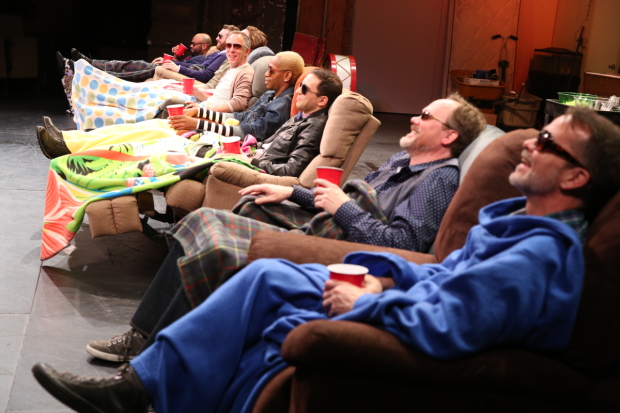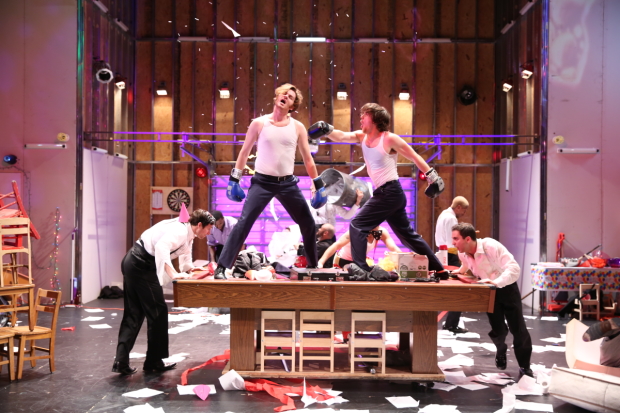The Glory of the World

(© Joan Marcus)
Seventeen bros gather to celebrate the 100th birthday of a Trappist monk. This is the premise of Charles Mee's The Glory of the World, a lighthearted, visually stimulating, and thoroughly meandering exploration of the themes surrounding the life of Thomas Merton, a Catholic monk and bestselling author.
At least, that is allegedly what the play is about. The Glory of the World is not about Merton the man (or the 60-some books he wrote), but all men — specifically, their testosterone. This large all-male cast raises the question: What happens when you put a bunch of dudes in close proximity to each other and give them no obligation to work? Apparently, the answer is a smattering of philosophical discourse followed by copious sex and violence.
Let's eat our spinach before moving on to dessert: The armchair philosophers in this play have a habit of raising big ideas by repeating the phrase, "As ___ said," filling in the blank with the thinker of their choice: Franz Kafka, Ronald Reagan, Oscar Wilde, Lady Gaga — everyone is fair game and Mee (delightfully) refuses to entertain any sense of high or low culture. They quote the dead and famous in support of their chosen worldviews, knowing full well that the figure they invoke will not come around to dispute the reading.

(© Joan Marcus)
This is particularly problematic when it comes to Merton, about whom the partygoers come to radically different conclusions: Some see him as a Communist, others as a Buddhist, and still others as a staunch Catholic. They unleash their quotes with wild abandon, trying to win others to their way of thinking by employing other people's pithy ideas.
Mee (Big Love) has built a career on the casual disregard of intellectual property law. He gleefully incorporates "found texts" and music into his plays, like a thrifty chef assembling a casserole from the neighbors' pantry. In turn, he offers these Franken-scripts free of charge on his website, encouraging directors to slice and dice at will. His bold assertion that all cultural is appropriation makes him one of the most thrillingly transgressive artists working in a theater dominated by IP lawyers and the antiquated notion of the playwright as God.
That's why it is disappointing that so much of The Glory of the World feels hastily constructed and half-considered. Plot lines are introduced and then quickly abandoned in favor of more exciting moments. For example, Conrad (a moody Conrad Schott) and Cameron (an elegant and powerful David Ryan Smith) are two quarreling lovers. After performing some air mattress gymnastics, Conrad reunites with Cameron through a passionate kiss. In celebration, all the men couple and dance to "So In Love" from Kiss Me, Kate. We never hear about their relationship again. Instead, we watch the men perform a muscle flexing dance or a synchronized swimming routine with a sprinkler on a slip-and-slide. Les Waters (who appears at the beginning and at the end of the show) directs with hyper-exuberance, as one would the workshop of a play that has not yet decided what it wants to be.
Appropriately, scenic designer Dane Laffrey sets the play in what appears to be a house under construction. Emerging from behind an automated garage door, the cast populates the space with accoutrements of American manhood: game tables, mounted deer trophies, and La-Z-Boy recliners. Heroically, costume designer Connie Furr Soloman costumes this massive cast in a variety of looks, from active wear to formal attire. With a drink cart at the ready, the actors wrap themselves in snuggies as they rock back and forth in their armchairs, sipping whiskey and talking about God. It feels like a frat house full of seminarians. I suppose one could describe the play as a primer on human behavior (consumption, sex, and violence lubricated lightly by philosophy is what we do), but the exclusion of an entire half of humanity (women) seems to be a major blind spot.

(© Joan Marcus)
The Glory of the World at least helps one understand Mee's passion for textual appropriation: Some of the original lines he writes sound awfully clunky. As their theological disagreements escalate, one man asks another, "You think it's OK to do some violence?" As if by divine retribution from the God of prose, he is immediately smacked in the face with a metal bowl.
This begins an epic 14-minute battle royal (brilliantly choreographed with painstaking detail by Ryan Bourque). Papers fly through the air, blood is spilt, and a man runs around the stage naked as others threaten to sodomize him with a toilet plunger. By the end, it is impossible to distinguish this BAM feature presentation from a Michael Alig theme party at Limelight.
"For a show about theology, at least I was never bored," a woman said as she exited onto Fulton Street. That is undeniably true. The Glory of the World is a fascinating hodgepodge of whimsy. Still, it is difficult to say what sets this play — an extravagant diversion with the thinnest thematic veneer — apart from the latest Hollywood superhero flick.











